Key takeaways:
- The future of work emphasizes flexibility, collaboration, and technological integration, impacting creativity and collaboration in the music industry.
- Technology is reshaping traditional roles, enabling remote work and fostering creativity through digital tools, although human connection remains essential.
- The rise of independent music production and social media platforms is changing how artists promote their work, balancing artistry with the pressure for virality.
- Record labels are evolving into partners that support artists’ visions, incorporating digital strategies to create more personal connections with audiences.
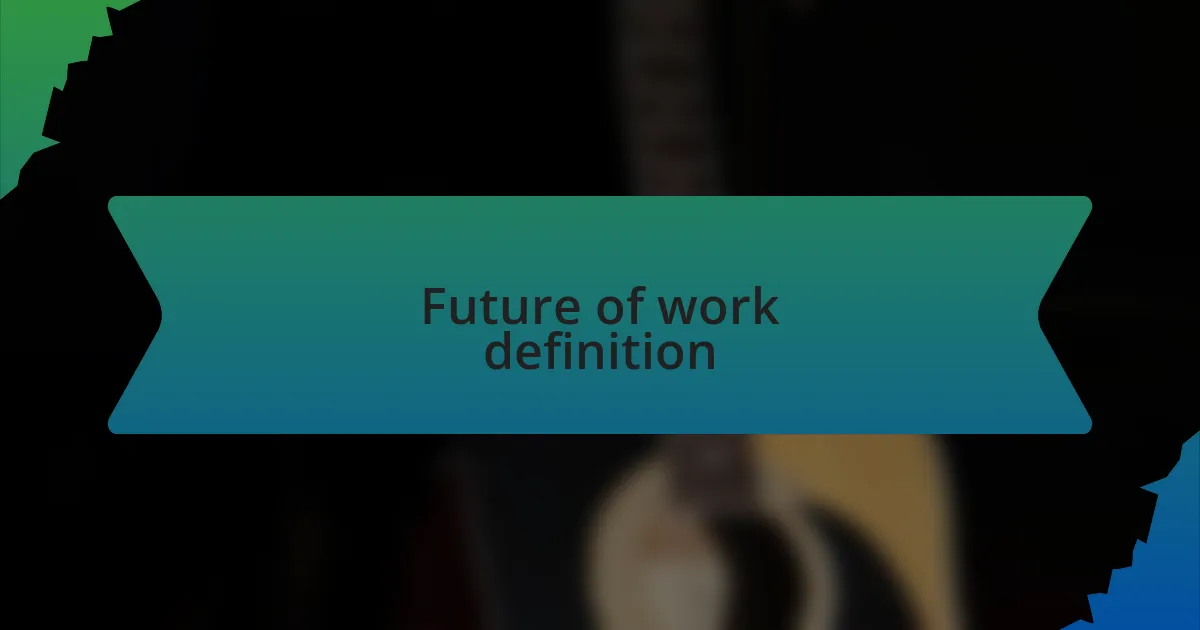
Future of work definition
The “future of work” refers to the evolving landscape of how work is structured, performed, and experienced, especially in light of technological advancements and shifting societal norms. I often find myself reflecting on my own career journey and how quickly things have changed. Remember when we all thought remote work was just a fleeting trend?
As organizations adapt to new technologies and employee expectations, the traditional workplace model is being redefined. I remember when I first started in the industry, everything revolved around being in the office. Now, the idea of a digital workplace feels not just possible but desirable. How will this transformation impact creativity and collaboration within the music industry, particularly for artists and their record labels?
Ultimately, the future of work embodies a blend of flexibility, collaboration, and technological integration. I can’t help but feel excited about the opportunities that lie ahead, but I also wonder—are we fully prepared to embrace these changes? It’s this mixture of anticipation and uncertainty that makes the conversation around the future of work so compelling.
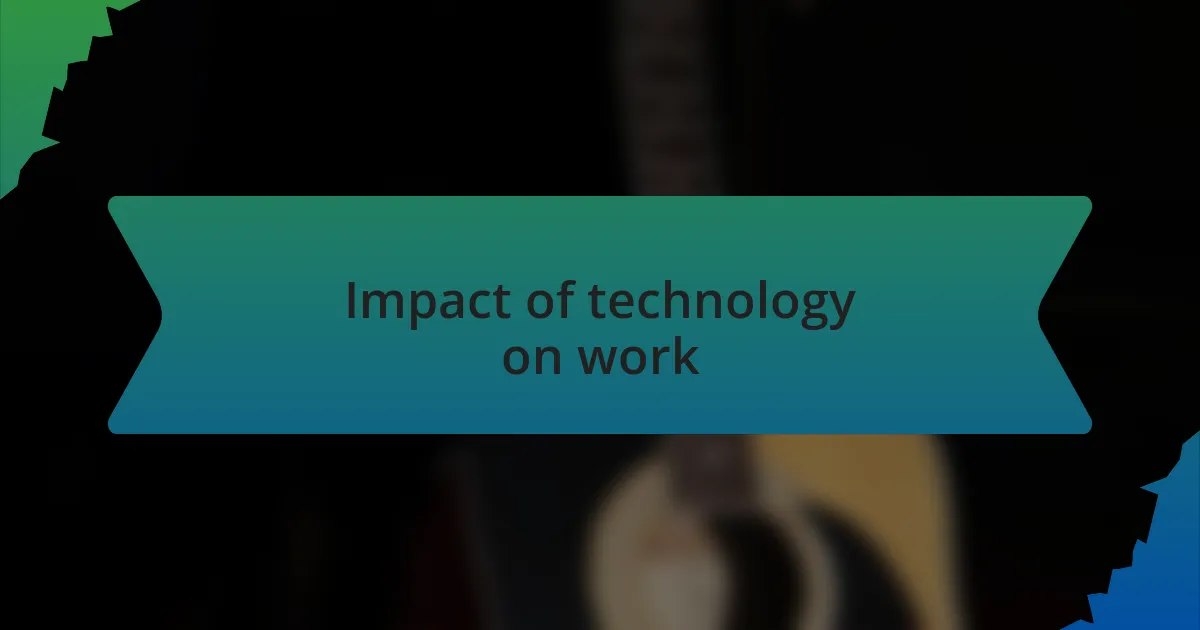
Impact of technology on work
As technology continues to evolve, its influence on the workplace cannot be understated. I personally witnessed this shift during a recent collaboration with remote artists, where technology allowed us to produce music in real-time despite being miles apart. It made me realize how crucial these advancements are for fostering creativity in ways I had never imagined.
The integration of tools like AI and cloud computing is transforming traditional roles within the music industry. I remember being hesitant about using a digital audio workstation (DAW) at first, thinking it would complicate things. Now, I find it to be a powerful ally, enabling innovation and experimentation while breaking down barriers that once confined us to certain methods of music production.
Yet, I often ponder—are we losing some human connection in all this tech-driven interaction? The ease of sending files and collaborating online is fantastic, but I still cherish those face-to-face moments in the studio. It’s a delicate balance—leveraging technology to enhance our work while ensuring we don’t forget the very essence of artistic collaboration that fuels our creativity.
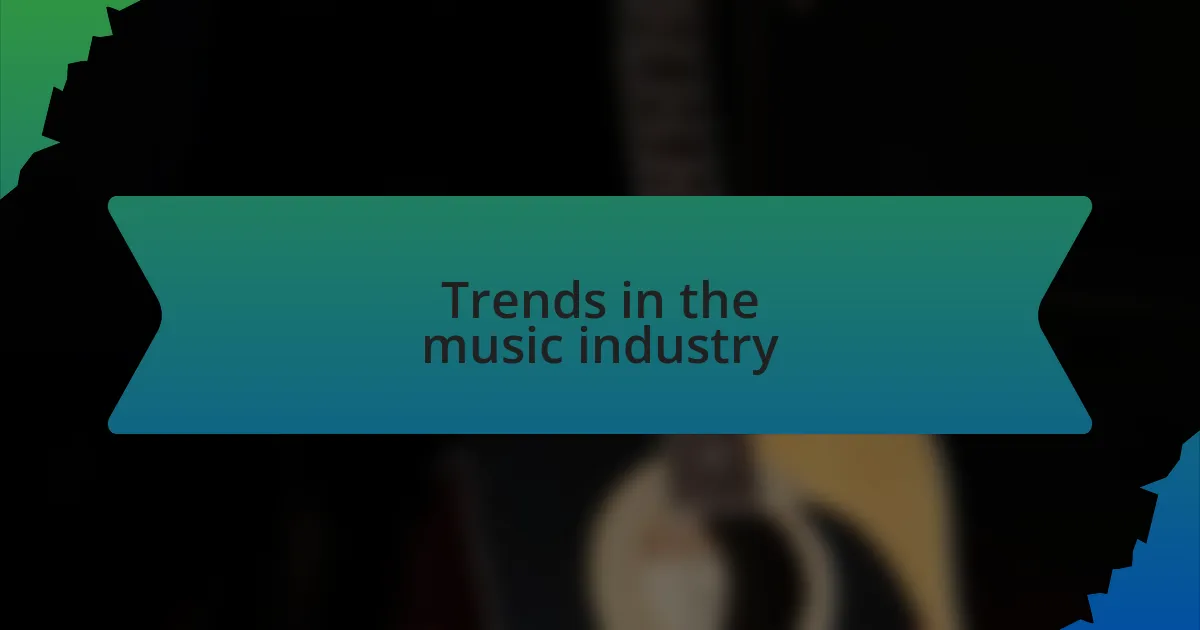
Trends in the music industry
Emerging trends in the music industry illustrate how artists are increasingly harnessing social platforms for growth. I find it fascinating how a song can become a global sensation simply from a TikTok challenge. Recently, I saw a local band get millions of streams overnight, all because someone created a catchy dance to their track. This shift underscores just how powerful social media can be—not just for promotion but as a creative tool.
Additionally, the rise of independent music production is reshaping the landscape. I remember attending a small gig where an unsigned artist captivated the room with raw talent and minimal resources. It struck me that more musicians are choosing to bypass traditional label paths, opting instead for DIY approaches. This trend not only offers creative freedom but also creates a diverse melting pot of sounds that challenges mainstream norms.
While I embrace these changes, I can’t help but wonder—are we risking the depth of artistry in favor of virality? The pressure to create content that fits a trend can sometimes overshadow the innate desire to tell a story through music. It’s a balancing act that artists today must navigate, and I am curious to see how it unfolds in this vibrant, rapidly changing industry.
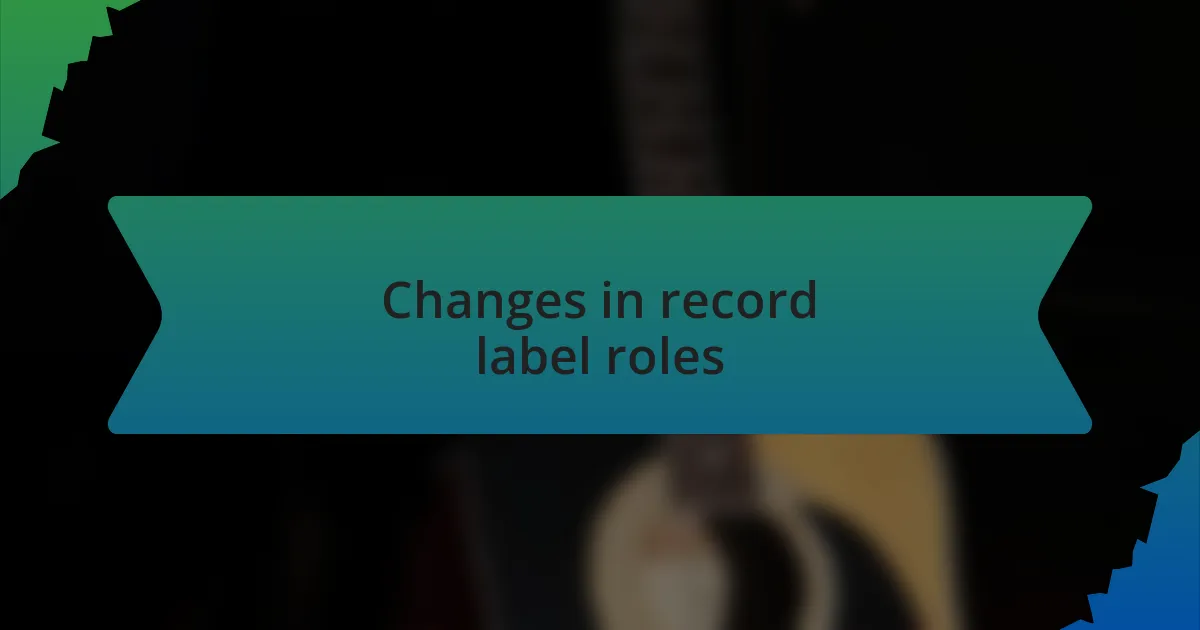
Changes in record label roles
As the music industry continues to evolve, the roles within record labels have seen a significant transformation. I’ve noticed that A&R representatives are no longer just scouts for talent; they now double as brand strategists who must understand social media analytics and audience engagement. I remember meeting a former A&R rep who transitioned into this role and expressed how crucial it was to not only identify a good song but to also promote it through targeted campaigns.
Moreover, the traditional marketing teams are adapting by integrating digital strategy into their core competencies. Reflecting on my experiences with various labels, I’ve seen firsthand how marketing managers have shifted from merely promoting album drops to curating entire digital experiences. It’s not just about releasing music anymore; it’s about creating a narrative that connects with listeners on a personal level. Have we reached a point where labels must become content creators themselves? I’m inclined to believe so.
In the face of these changes, I can’t help but think about the artists’ perspective. Record labels are now seen as partners who are more involved in the creative process. I recall chatting with a young artist who expressed relief at having a label that genuinely supported their artistic vision while also providing the tools and resources needed to thrive in a digital-first landscape. This collaboration opens up new opportunities for innovation in the music-making process, and it’s inspiring to see how these relationships evolve.
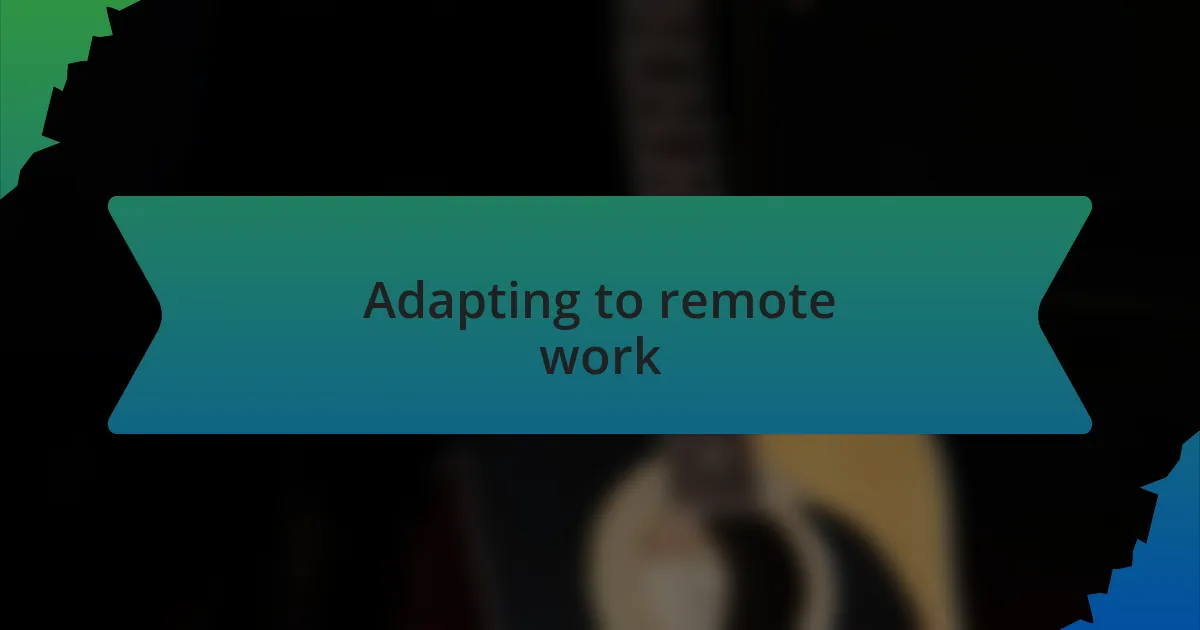
Adapting to remote work
Adapting to remote work has reshaped how we collaborate within the music industry. I remember the initial challenges when my team transitioned to virtual meetings; figuring out how to replicate that spontaneous creativity often sparked during in-person brainstorming sessions felt daunting. But then we discovered the power of digital collaboration tools like Slack and Zoom, which allowed us to share ideas in real-time, ultimately enhancing our workflow.
I’ve also found that maintaining a strong team culture while working remotely is essential. In my experience, regular check-ins and virtual socials helped strengthen relationships among team members. It’s fascinating how a simple “coffee chat” over a video call can help foster camaraderie, just like those impromptu conversations in the office that once made the workplace so vibrant.
One thing that stands out to me is the flexibility that remote work offers. I spoke with an artist manager who shared how they can now coordinate schedules with artists across different time zones more efficiently. Isn’t it incredible how technology enables a broader reach and deeper connections, even when we’re physically apart? It makes me optimistic about the potential for innovation that remote work can unlock in the music industry.
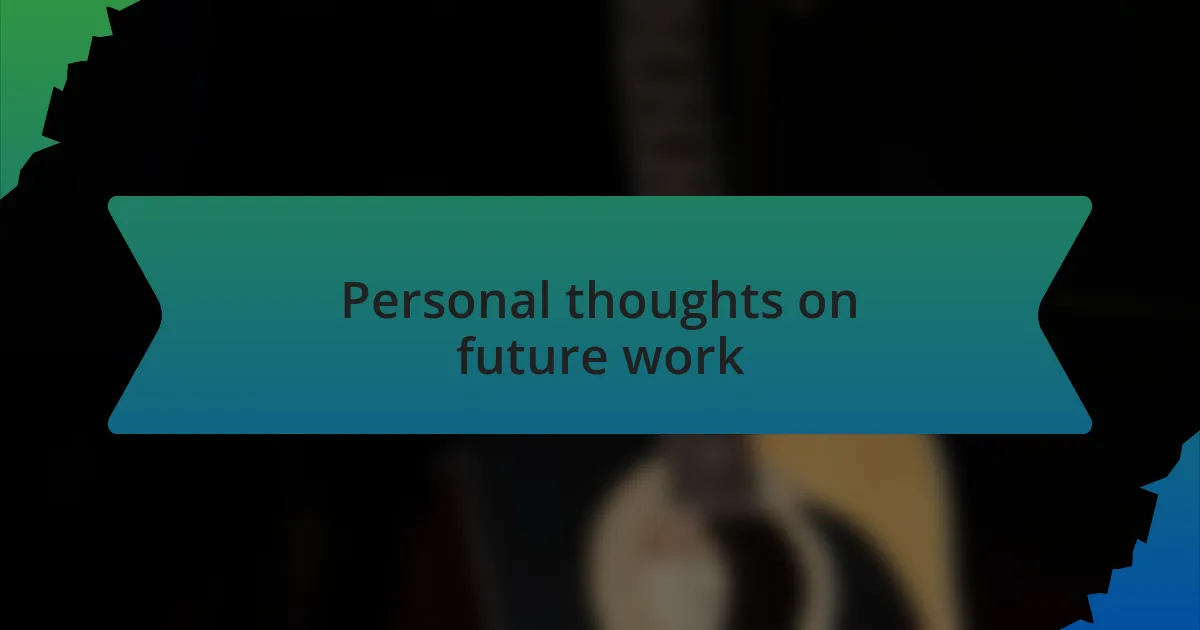
Personal thoughts on future work
There’s something exhilarating about imagining a future where work is less about rigid hours and more about outputs and creativity. I remember discussing this with a fellow producer, who mentioned how they now work at their peak hours, whether that’s late at night or early in the morning. Isn’t it liberating to break free from the traditional 9-to-5 mindset? I think this shift could make artists and their teams more productive and satisfied.
As we move forward, the relationship between technology and creativity will only deepen. I’ve seen firsthand how streaming platforms and social media have changed artist promotion, turning musicians into their own marketing teams. I often ask myself, what will the next wave of tools look like? The thought of an all-in-one platform that combines collaboration, promotion, and distribution feels just around the corner, making me excited about the possibilities.
However, with all these advancements, there’s a deeper concern I carry: the need for genuine connections in an increasingly digital world. I once attended a virtual festival that was captivating but oddly isolating. While the production quality was outstanding, I missed the energy of being part of a live audience. Will we lose that emotional spark if we rely too heavily on technology? It’s vital that we find ways to balance innovation with authenticity to ensure that the essence of music remains intact.
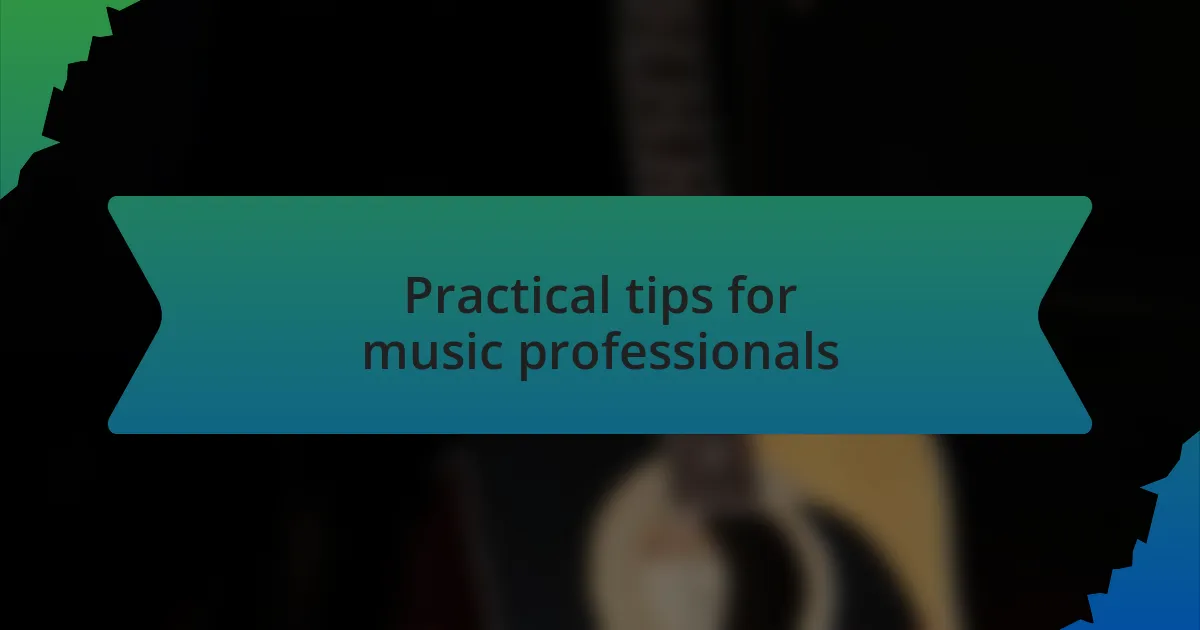
Practical tips for music professionals
Networking is crucial in the music industry, and I can’t stress enough how important it is to build and maintain relationships. I recall a time when I attended a small showcase, not expecting much, but ended up striking up a conversation with an emerging artist who later collaborated with me on a project. You never know who might open doors for you, so make it a point to attend events, even if they seem minor at first.
Embrace the power of technology, but use it wisely. I’ve witnessed too many artists get lost in the sea of digital tools, overwhelmed by options. I suggest starting with one or two platforms that resonate with your goals. For instance, if your strength is in storytelling, a platform like Instagram might serve you well. Focus your energy there, and gradually expand as you get comfortable.
Developing a personal brand has become non-negotiable, and I found that being authentic is the key. When I began sharing more behind-the-scenes moments of my creative process, I noticed a significant increase in engagement. Think about what sets you apart—what’s your story? Authenticity resonates, and it allows fans to connect with the real you, making your music even more relatable.